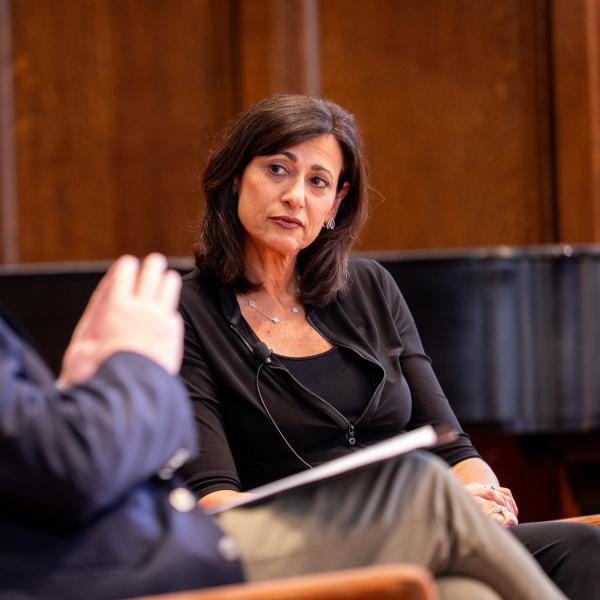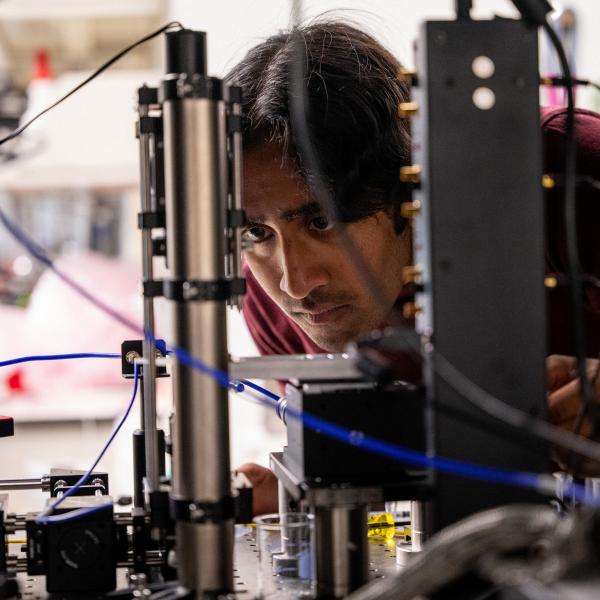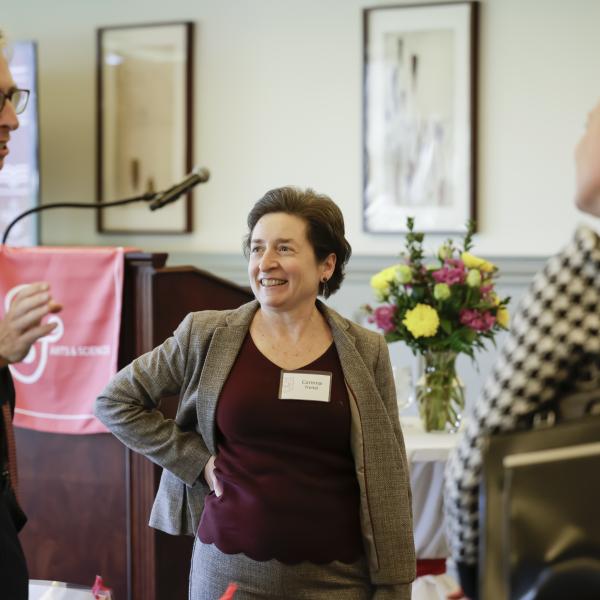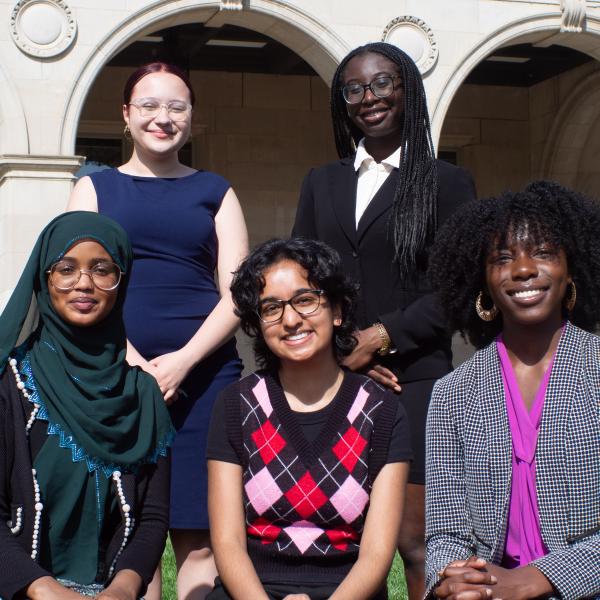Maria Ruiz is a Scholar in Arts & Sciences. Because of her scholarship, Maria Ruiz had the opportunity to be a Washington University student.
We walk back towards the DUC after taking pictures under the flowering trees in front of Graham Chapel. Maria Ruiz looks down at a dress that might be more suited to a board room than a college quadrangle, “Well I’m glad I didn’t wear a t-shirt today.” She laughs explaining that she was going to be talking to some professors today about writing letters of recommendations and wanted to look professional. I soon learn that Maria Ruiz could have very well worn a t-shirt to those meetings—for this year’s Arts & Sciences Recognition Ceremony student speaker, accomplished is an understatement.
For any graduating senior, it’s nice to reflect on where it all began. For Ruiz specifically, that means Tegucigalpa, the capital city of the Honduras. “I was born and raised in Tegucigalpa, and when I was 13, my parents decided to move to the United States. We moved to Farmington, Missouri and that transition to small-town life and a radically different culture has really shaped how I view the world,” she says. “Moving caused me to mature fairly quickly, and to take on new responsibilities within my family. It made me grapple with what it means to be an immigrant woman of color. I also learned to appreciate so much about my culture, and once I left, I had a lot of nostalgia. By the time I was applying to college, I found that my interests all began to channel back to social justice in the Honduras.”
After arriving at WashU, a choice that seemed like a “no brainer,” given its proximity to home and her acceptance into the Rodriguez Scholars Program, Ruiz found that the Global Health track in the anthropology department would be the perfect field of study to foster this affinity for social justice. Ruiz says social justice began to take new meaning after taking Peter Benson’s “Intro to Global Health” course. “Benson’s class changed my understanding of social justice. It gave me a critical lens to analyze institutions, projects, and my own actions,” she says. “I returned to Honduras over a winter break, and participated on a brigade through Global Brigades. It was during this trip that my interest in health, in perhaps becoming a physician, became evident to me.”
I ask Ruiz about what her WashU experience looked like outside of academics, and we both pause and laugh about how at WashU that’s a pretty difficult distinction to make. She explains that a critical component of her experience here has been her involvement in the Rodriguez Scholars Program. “The people in that group are passionate about social justice, and being at a university with great mentors and with peers who want to drive social change gave me the energy to dive deeply into that—both in St. Louis and in the Honduras.”
One of Ruiz’s favorite memories from her time at WashU is an annual gathering of the Rodriguez scholars in Brookings on the Sunday before classes start. Students light candles, share their goals and expectations, and choose one hope for the year. “It’s a reminder of the community we have here,” Ruiz says. “From my experience with the Rodriguez scholars, I was inspired to apply to other things like the Civic Scholars Program, which is a group of people who I know will be close with for a lifetime.” Ruiz commented, too, that the Civic Scholars Program gave her an understanding of St. Louis as a city, and of how WashU interacts with the greater St. Louis community. This proved to be especially meaningful for Ruiz, who expresses a great deal of interest in context when studying Global Health—the Civic Scholars Program offered a chance to consider the complicated context of WashU within St. Louis.
Beyond this, Ruiz is an RA as well, an experience she cites as formative in not only becoming more independent, but also more empathetic. “Being an RA for first-year students has been one of the most difficult things that I’ve done,” she says. “It puts me in a situation where I have to help students find healing in personal struggles or interpersonal conflict. Students rely on me, but I learn so much from them too. I’ve developed really meaningful relationships with my residents.” When asked what she’s learned specifically from her time as an RA, she pauses. “Giving feedback without be harsh. You never know what another person is going through, so I’ve learned to be able to provide feedback when I need to, but in a delicate manner. I didn’t really do that well before.”
When she’s not on campus, you can often find Ruiz running through Forest Park, around the Art Hill basin, or participating in the “Go!St.Louis” races around the city. As for the coming year, she’s eyeing a marathon. But beyond her plans to conquer more races, she’s still figuring out what’s next for the coming year. “I’m debating between staying in St. Louis and going to Guatemala right now, and I think my heart is pulling me towards Guatemala,” she says. “I was awarded a Princeton in Latin America fellowship. If I move to Guatemala, I would be in Santiago de Atitlán working as the maternal and infant health program coordinator for the local hospital. After that, I hope to go to medical school—if they take me!”
These plans, though, are for later down the line. We conclude by chatting about preparing for a more immediate challenge: her speech. Much like the preparation for the marathon Ruiz hopes to run in the next year, this preparation has been a day-by-day process. Through some soul-searching and running, she’s been concentrating on finding her message. “I want to address the clichés without being cliché. I don’t want to get up there and say something that people could have Googled. I don’t have anything particularly revolutionary to share, but I still hope to deliver a message that is felt. I think it needs to be a speech crafted with intention.”
Given her accolades, dedication, and exposure to a variety of tight-knit communities on campus, I have no doubt that Ruiz will find this intention. In navigating her own experience, and in speaking through this unique lens, she will locate meaning that will be anything but clichéd.




Leave a Comment:
0 Comments